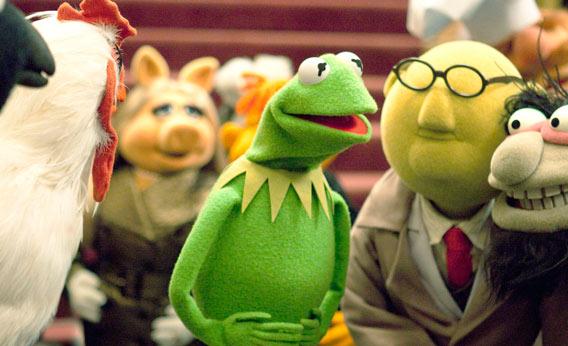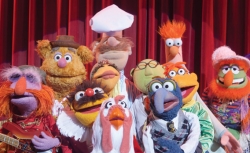Welcome Back, Kermit
Frog march your family to the new Muppets movie this holiday weekend.

Scott Garfield © Disney.
Click on the audio player below to listen to Slate's Spoiler Special podcast on The Muppets after you've seen the movie.
There are two ways a review of The Muppets (Disney) could go. A skeptic might ask—a bit old-crankishly, but not without reason—why this franchise needed to be rebooted in the first place, or, for that matter, to be dragged into a world where “franchise reboot” is a meaningful combination of syllables. Such a review might speculate about our generation’s anxious, melancholy, yearning relationship to the pop culture of its youth, how that yearning differs from that of earlier generations for whom television was less of an ambient childhood medium, and what we gain from these ceremonies of mass regression.
Maybe I’ll ponder those questions one day—Lord knows the unadventurous tastes of Hollywood executives are likely to provide future chances to muse on generational nostalgia. But let’s stipulate for the purposes of this discussion that this movie has a right to exist, and evaluate it on its own terms. Unless you’re such a purist that you have a Scooter puppet in its original packaging on a shelf in your bedroom, your most pertinent questions as regards the new Muppet movie are probably, a) Is it an abominable desecration? And, b) Should I take Mom and the kids to see it on Thanksgiving? And the answers are, respectively, not at all and hell, yeah.
Directed by James Bobin (Da Ali G Show, Flight of the Conchords) and co-written by Nicholas Stoller (Get Him To The Greek) and the film’s star Jason Segel, the first big-screen Muppet adventure of the 21st century is an exuberant, sunny musical that’s occasionally tongue-in-cheek but never even remotely snarky. It respects the spirit of the original while finding ways to update it, beginning by presupposing a world in which creatures of flesh and blood coexist alongside those of foam and felt. (Come to think of it, that was also the case on both Sesame Street and the original The Muppet Show, but there, the human/muppet dichotomy was never acknowledged; Gordon and Big Bird didn’t hang out on the stoop and contemplate the implications of their interspecies friendship.)
As the film begins, Gary (Jason Segel) and Walter (voiced by Peter Linz) live together as blissfully in-sync roomies, rollerskating their way through a charmed small-town life. Yes, Gary is human and Walter a puppet, but the two have grown up together as “brothers”—an opening childhood montage never shows the boys’ parents, leaving open the question of whether theirs was a mixed flesh/felt marriage. Gary has a girlfriend, the apple-pie-sweet schoolteacher and crackerjack mechanic Mary (Amy Adams at her fresh-scrubbed best), but he still sleeps in a twin bed alongside his small cloth buddy, in matching plaid pajamas.
To celebrate his and Mary’s 10th anniversary (!), Gary buys bus tickets from their wholesome hamlet of Smalltown to Los Angeles. Walter comes along, to Mary’s well-disguised disappointment—she’d been hoping for a romantic vacation, maybe even a proposal. But Walter’s passion for the long-canceled The Muppet Show is such that the couple agrees to take him on a tour of the old studios, which have fallen into a sorry state of disrepair. There, Walter accidentally eavesdrops on the heartless oil tycoon Tex Richman (Chris Cooper) who’s plotting with his two evil puppet cohorts to destroy the old soundstage and drill for oil on the land.

Scott Garfield © Disney.
Will Gary, Mary, and Walter be able to unite the old Muppet gang, put on a show, and raise the $10 million they’ll need to hold on to the old theater? Cue the movie’s best 20 or so minutes, in which the travelers visit, in turn, Kermit the Frog (voiced by Steve Whitmire), who’s living in a decrepit, Sunset Boulevard-style Hollywood mansion; Fozzie Bear (voiced by Eric Jacobson), who’s performing in a sketchy Muppets tribute band in Reno; and Miss Piggy (also voiced by Jacobson), who, in an inspired detail, is now the plus-size editor for French Vogue. The remainder of the crew, from blue-feathered daredevil Gonzo to chinless lab assistant Beaker, are rounded up in a time-saving musical montage helpfully suggested by Kermit’s manservant, a 1980s-vintage robot.
The movie’s second half, in which the felted vaudevilleans struggle to create and rehearse a fundraising telethon in a matter of days, loses some of the head of steam built up in the first hour. There are too many competing story threads (Gary and Mary’s courtship, Walter’s identity crisis, an ill-fated plot to kidnap Jack Black), and I’m not sure there exists a context, in this movie or out, in which we need to hear Chris Cooper rap.
Whenever the energy starts to flag, though, an inspired musical number will come along to pep things up. When the whole company gathers onstage during the telethon for a group rendition of the classic Paul Williams/Kenny Ascher song “The Rainbow Connection,” anyone born between the Johnson and Carter administrations may have trouble keeping it together. But the film’s musical tour de force is a plot-advancing power ballad, co-written by Segel, in which Gary and Walter ponder their reflections in the mirror as they ask that ultimate self-searching question, “Am I a man or am I a Muppet?”
In Jason Segel, the filmmakers found perhaps the one actor who could infuse that existential dilemma with real ambivalence. Big, floppy, earnest, and loveable, Segel is a human Muppet of sorts—not to mention a lifelong enthusiast who, for his role in Forgetting Sarah Marshall, wrote and performed songs for an imagined “vampire puppet musical.” The Muppets is, in some ways, the natural extrapolation of that project, a sort of big-budget work of loving fan fiction. It’s that sense that The Muppets springs from an individual vision—that it’s the complete opposite of a focus-grouped, studio-driven “reboot”—that sustains the film even through its weaker stretches. The creators of The Muppets clearly love their source material, corny jokes and all, and they’re eager to bring to a new generation what one character calls the “third-greatest gift of all” (laughter, which apparently comes right after children and ice cream). Like Statler and Waldorf, older viewers may kvetch and cavil about the details, but when that red velvet curtain goes up, we wouldn’t give up our balcony seats for the world.
